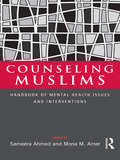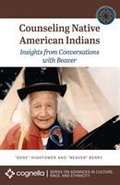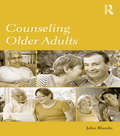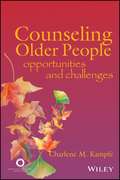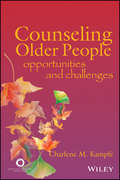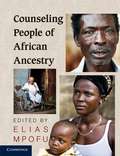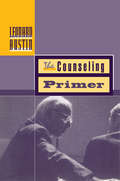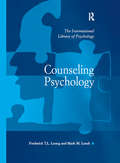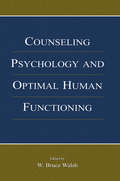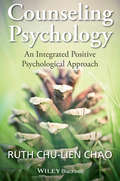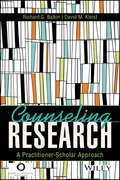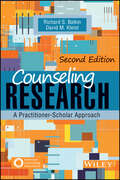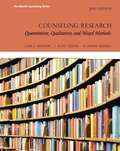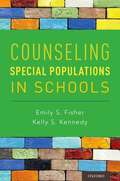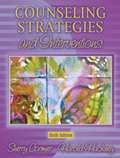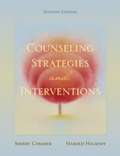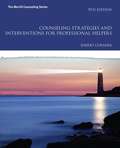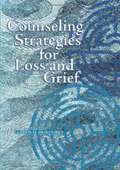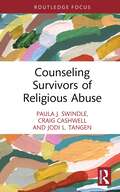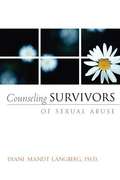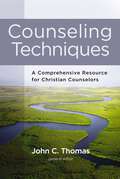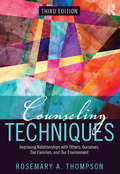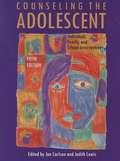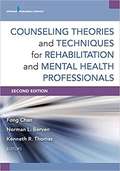- Table View
- List View
Counseling Muslims: Handbook of Mental Health Issues and Interventions
by Mona M. Amer Sameera AhmedA young female client presents with anorexia nervosa and believes that her problem has its roots in magic; parents are helpless in the face of their son's substance abuse issues; an interracial couple cannot agree on how to discipline their children.How would you effectively help these clients while balancing appropriate interventions that are sensitive to religious, cultural, social, and gender differences? This handbook answers these difficult questions and helps behavioral health practitioners provide religio-culturally-competent care to Muslim clients living in territories such as North America, Australia, and Europe.The issues and interventions discussed in this book, by authoritative contributors, are diverse and multifaceted. Topics that have been ignored in previous literature are introduced, such as sex therapy, substance abuse counseling, university counseling, and community-based prevention. Chapters integrate tables, lists, and suggested phrasing for practitioners, along with case studies that are used by the authors to help illustrate concepts and potential interventions.Counseling Muslims is also unique in its broad scope, which reflects interventions ranging from the individual to community levels, and includes chapters that discuss persons born in the West, converts to Islam, and those from smaller ethnic minorities. It is the only guide practitioners need for information on effective service delivery for Muslims, who already bypass significant cultural stigma and shame to access mental health services.
Counseling Native American Indians: Insights from Conversations with Beaver
by Eugene Hightower Turner BerryCounseling Native American Indians: Insights from Conversations with Beaver expertly weaves the story of Beaver, a member of the Choctaw Nation of Oklahoma who embraced Native American Indian spiritual practices to overcome substance abuse, together with insights on how to incorporate the cultural beliefs underlying these practices into daily living. The book also offers guidance to non-indigenous counselors and others who wish to work effectively within the Native American Community in reservation or urban settings. <p><p> In opening chapters readers learn from Beaver's detailed account practical insights on Indian cultural values from growing up in a communal Choctaw community in Oklahoma. Subsequent chapters feature interviews with Beaver, which recount his experiences growing up in a loving Choctaw family that was led by a medicine man uncle, surviving abuse in an Indian boarding school, surviving combat in the Pacific during World War ll, and relocating into an urban Indian community where he started a substance abuse treatment program for Native American Indians. He recounts his evolution from substance abuser to a leader of traditional ceremonies such as the sweat lodge and vision quest. He became a highly respected healer who helped many find relief from physical and emotional problems, as recounted by other individuals in this book. The book also offers information on the structure of the modern day Native American Indian community and stresses the importance of modern day Indians adhering to traditional values. <p> Counseling Native American Indians simultaneously shares the inspiring story of Beaver's life while providing valuable advice for counseling Native American populations. The text is well suited for courses in Native American Studies and psychology and counseling, especially those that focus on multicultural approaches.
Counseling Older Adults
by John BlandoCounseling older adults is not equivalent to counseling the general population, and specialized skills and knowledge, as well as sensitivity to the contexts in which older adults live, are essential in working successfully with this population. This text provides an introduction to gerontological counseling, integrating the basic skills of working with older adults with theories of counseling and aging. Specific counseling issues discussed include mental health counseling, career counseling, rehabilitation counseling, and family counseling. Along with these, important contextual factors such as race/culture, social class, social justice, spirituality, Alzheimer’s and other dementias, and family issues are considered in light of the latest research. Each chapter contains case studies, discussion questions, a glossary, and suggestions for further reading to reinforce the material presented.
Counseling Older Adults
by Kampfe"This book provides insight into the primary issues faced by older adults; the services and benefits available to them; and the knowledge base, techniques, and skills necessary to work effectively in a therapeutic relationship. Dr. Kampfe offers empirically and anecdotally based strategies and interventions for dealing with clients' personal concerns and describes ways counselors can advocate for older people on a systemic level. Individual and group exercises are incorporated throughout the book to enhance its practicality. Topics covered include an overview of population demographics and ..."--
Counseling Older People: Opportunities and Challenges
by Charlene M. KampfeThis book provides insight into the primary issues faced by older adults; the services and benefits available to them; and the knowledge base, techniques, and skills necessary to work effectively in a therapeutic relationship. Dr. Kampfe offers empirically and anecdotally based strategies and interventions for dealing with clients’ personal concerns and describes ways counselors can advocate for older people on a systemic level. Individual and group exercises are incorporated throughout the book to enhance its practicality. Topics covered include an overview of population demographics and characteristics; counseling considerations and empowering older clients; successful aging; mental health and wellness; common medical conditions; multiple losses and transitions; financial concerns; elder abuse; veterans’ issues; sensory loss; changing family dynamics; managing Social Security and Medicare; working after retirement age; retirement transitions, losses, and gains; residential options; and death and dying. *Requests for digital versions from the ACA can be found on wiley.com. *To request print copies, please visit the ACA website here. *Reproduction requests for material from books published by ACA should be directed to permissions@counseling.org.
Counseling People of African Ancestry
by Elias MpofuThis volume advances a uniquely Afro-centric, sociocultural understanding of health maintenance and risk reduction in African cultural heritage populations. It unites a diverse group of leading African and Africanist scholars in an exploration of common cultural values in African heritage communities and their practical applications in contemporary counseling. The chapters highlight the prominent health issues faced in Africanist settings today and use real-world experiences to illustrate core lessons for effective community action. The approach spans complex cultural milieus, from diversity counseling to conflict resolution. Each chapter includes field-based experiential tasks, discussion boxes, research boxes and case studies, which serve as valuable resources in both coursework and casework. Counseling People of African Ancestry is an essential primer for community health workers, counselors and educators seeking a better understanding of African cultural heritage settings to promote community health, well-being and development.
Counseling Primer
by Leonard A. Austin"First Published in 1998, Routledge is an imprint of Taylor & Francis, an informa company."
Counseling Psychology (The International Library of Psychology)
by Mark M. LeachSince its beginnings after WWII, Counseling Psychology has grown to become an applied specialty within psychology with unique areas of emphasis. This book introduces readers to the field by presenting its history, emphases, trends and relationships to other areas within psychology, followed by seminal articles that have significantly influenced counselors and researchers. The volume is organized around the six general themes of history and professional development, personal counseling, career counseling, cross-cultural counseling, counseling process and outcome, and internationalizing Counseling Psychology. In presenting articles representing these six themes that have defined counseling psychology, readers are given an essential overview to the past, the present and future directions of this applied specialty in psychology.
Counseling Psychology and Optimal Human Functioning (Vocational Psychology Series)
by W. Bruce WalshCounseling psychologists have always been vitally involved in promoting good health and preventing mental, physical, and social disorders. This volume focuses on how their efforts can foster and build optimal human strength and well-being. The chapters show how counseling psychology plays a major role in helping people make changes at home, at work, and in the community in ways that prevent disease risk and strengthen personal and social resources. Written by leading psychologists, the volume shifts away from pathology and illness and moves more toward the science of positive psychology. Five major themes--intact personalities, individual assets and strengths, positive mental health, person--environment interaction, and career development-are discussed. These serve to unite the roles and tasks of counseling psychology. All students and professionals concerned with mental health and career counsiling with find Counseling Psychology and Optimal Human Functioning thought-provoking and helpful reading.
Counseling Psychology: An Integrated Positive Psychological Approach
by Ruth Chu-Lien ChaoCounseling Psychology: An Integrated Positive Approach introduces a new dimension in counseling psychology which includes both symptom treatment and positive psychology; this unique approach guides readers to enhance clients’ positive potential, rather than focusing solely on the treatment of clients’ negative symptoms. An integrative counseling approach which maximizes graduate students’ understanding of counseling theories and positive psychology Enables counselors to tailor integrative counseling to multicultural clients, helping graduate students and mental health professionals become culturally sensitive Discusses how clients manage day to day living, and can even thrive despite severe symptoms
Counseling Research: A Practitioner-Scholar Approach
by Richard S. Balkin David M. KleistThis introductory text for counselors-in-training and emerging researchers focuses on research methodology, design, measurement, and evaluation. Richard Balkin and David Kleist explain the primary research methods used in counseling while emphasizing the importance of ethics and multicultural issues, demonstrating a professional counselor identity within the framework of research, and outlining the specific approaches used to inform counseling practice. The book contains four parts: The Essence of Research in the Counseling Profession, Quantitative Research Designs, Qualitative Research Designs, and Practice-Based Research. <p><p> Key features include case examples that bridge the technicalities of research and the realities of practice; strategies for designing research; guidelines for counselors considering topics for a thesis, a dissertation, or the development of an initial study; examples of current counseling research articles; and suggested activities to enhance understanding of the material in each chapter and facilitate classroom discussion.
Counseling Research: A Practitioner-Scholar Approach
by Richard S. Balkin David M. KleistThis widely adopted and accessible introductory text for counselors-in-training and emerging researchers provides a foundational understanding of the primary research methods used in counseling and how these concepts can be applied to research design. Writing in a clear and conversational tone, the authors emphasize the importance of ethics and multicultural issues in informing research, demonstrate a professional counselor identity within the framework of research, and outline specific evidence-based and empirically supported findings for counseling practice. This book contains four parts tht explain the practitioner-scholar model and the research process, quantitative and qualitative research methodology and design, and research measurement and program evaluation. Key features include a discussion of the fundamentals of statistics, practical research design illustrations in each chapter, guidelines for the development of an initial study, and suggested activities that synthesize and apply chapter content. New to this edition is a glossary to assist readers with the technical terms discussed in the text and a test manual and PowerPoints for instructors' use, which are available by request from the American Counseling Association. *Requests for digital versions from ACA can be found on www.wiley.com *To purchase print copies, please visit the ACA website here *Reproduction requests for material from books published by ACA should be directed to permissions@counseling.org
Counseling Research: Quantitative, Qualitative, And Mixed Methods
by J. Young Carl Sheperis M. DanielsThe text introduces reader to the basics of how to do research–from formulating a problem, doing a literature review, selecting a design, collecting and analyzing data, through reporting results. It also provides readers with the information they need to become intelligent consumers of published research. Covering a broad range of quantitative, qualitative, and mixed methods designs, as well as action research and program evaluation, the text presents the most common types of research used in the field of counseling.
Counseling Special Populations in Schools
by Emily S. Fisher Kelly S. KennedyCounseling Special Populations in Schools provides school-based mental health professionals with practical, specific strategies for counseling special populations of students who are at risk for academic, social, emotional, and behavioral problems in school. These special populations include students who are homeless, living in foster care, involved with the juvenile justice system, LGBTQ, pregnant or parenting, gifted, in military families, at-risk for school failure and dropout, and impacted by incarcerated parents. Each chapter focuses on one group of students, highlighting critical background information and providing evidence-informed counseling approaches and strategies to promote resilience and support student development. Chapters provide specific information about how to use basic counseling skills, as well as more advanced counseling techniques such as Solution-Focused Brief Therapy, Cognitive Behavioral Therapy, and Motivational Interviewing, to address the needs and challenges of these special populations of students. This advanced-level counseling book is an excellent resource for mental health professionals and graduate students who want to be able to provide effective counseling services for all students.
Counseling Strategies and Interventions
by Sherry Cormier Harold HackneyCounseling Strategies and Interventions, Sixth Edition, prepares students for the real world of counseling people in today's global society from an integrative perspective.
Counseling Strategies and Interventions (7th edition)
by Sherry Cormier Harold HackneyEmphasizing the importance of interpersonal skills to counseling, this textbook contains ten chapters on topics such as recognizing communication patterns, managing the counseling session, responding to cognitive content, responding to affective content, conceptualizing issues and setting goals, interactive counseling strategies, and common challenges. The authors are affiliated with West Virginia University and Syracuse University. Annotation ©2004 Book News, Inc., Portland, OR (booknews.com)
Counseling Strategies and Interventions for Professional Helpers
by Sherry CormierThis pragmatic text describes basic helping skills used in a variety of disciplines, as well as a number of issues common to helping relationships, processes, and interviews. Suitable for both upper level undergraduate and entry level graduate students, the text focuses on skill acquisition, and includes a number of clinical cases and application exercises for promoting skill development.
Counseling Strategies for Loss and Grief
by Keren M. HumphreyThis practice-oriented book describes a range of effective counseling strategies appropriate for the treatment of diverse loss and grief issues commonly presented in individual, family, and group psychotherapy settings. Based on contemporary understandings of the nature of personal and interpersonal loss and the ways in which people integrate loss and grief into their lives, this innovative book focuses on tailoring interventions to the uniqueness of the griever's experience.
Counseling Suicidal People: A Therapy of Hope
by Paul QuinnettCounseling Suicidal People provides the therapist, counselor, social worker, nurse, pastor, and mental health professional with a practical set of tools with which to intervene and work with suicidal people. Designed and written for the nonexpert in clinical suicidology, it has been called the quintessential book for suicide prevention.
Counseling Survivors of Religious Abuse (Routledge Focus on Religion)
by Craig Cashwell Paula J. Swindle Jodi L. TangenThis book identifies and analyzes the forms, causes, and potential treatments of religious abuse. Religious abuse can include experiences of sexual, physical, emotional, spiritual, and mental abuse connected to a religious context. The book will help readers understand different types of religious abuse, including where the perpetrator is a religious leader, a group, or a system, as well as when there is an overtly spiritual element connected to the justification for the abuse. It also describes common experiences of those who have experienced religious abuse and some treatment approaches that will be useful to mental health providers when their clients present with these experiences. The rigorous scholarly approach of this book provides an academically grounded insight into this complex topic. As such, it will be a key reference for those studying and working in Religious Studies, Religion and Psychology, the Sociology of Religion, and Counseling and Mental Health.
Counseling Survivors of Sexual Abuse (AACC Counseling Library)
by Diane Mandt LangbergThis powerful book deals with the issue of how Christians, especially those called to counsel, can help survivors of sexual abuse find healing and hope. From 20 years of experience, the author demonstrates how counselors can walk alongside people deeply wounded by sexual abuse as they face the truth about who they are, who their abuser was, and who God is as the Savior and Redeemer of all life. Counseling Survivors of Sexual Abuse issues a strong call to the church at large to walk with survivors through the long dark nights of their healing.
Counseling Techniques: A Comprehensive Resource for Christian Counselors
by John C. ThomasCounseling Techniques provides a useful resource for any type of counseling practitioner. Presenting a wide variety of the most effective and commonly used techniques associated with various diagnoses, theoretical bases, and client populations, it offers experienced therapists and students alike a single, trustworthy resource for clinical reference and guidance.Each chapter includes a user-friendly, step-by-step explanation of the techniques covered. Sections survey the following:Basic types of techniques (cognitive, behavioral, experiential, and more)Techniques for children, adolescents, adults, couples, and familiesTechniques for a wide variety of individual and family issues, including emotional dysregulation, shame, loss, sexual abuse, trauma, domestic violence, attachment wounds, and much moreFeaturing a lineup of top-notch, highly experienced counselors and thoroughly integrated with a Christian worldview, Counseling Techniques will equip therapists and students in various helping disciplines for the frequent clinical issues that arise in all forms of counseling.
Counseling Techniques: Improving Relationships with Others, Ourselves, Our Families, and Our Environment
by Rosemary A. ThompsonThe third edition of Counseling Techniques follows in its predecessors’ steps, presenting the art and science of counseling in a clear and common-sense manner that makes it accessible for counseling students and seasoned practitioners alike. New to this edition are chapters on play therapy and a host of other updates that illustrate ways to use different techniques in different situations. Counseling Techniques stresses the need to recognize and treat the client within the context of culture, ethnicity, interpersonal resources, and systemic support, and it shows students how to meet these needs using more than five hundred treatment techniques, each of which is accompanied by step-by-step procedures and evaluation methods.
Counseling The Adolescent: Individual, Family, And School Interventions. 5e
by Jon Carlson Judith A. LewisAddresses the important issues related to adolescence. This book provides practical intervention strategies and methods, and material on resilience in children, causes of bullying, school violence, conflict resolution, ethics, and more. It emphasis on partnerships of school, community, and agencies; and covers changes in counseling practice.
Counseling Theories And Techniques For Rehabilitation And Mental Health Professionals
by Fong ChanThe only text about counseling theories and techniques developed specifically for upper-level rehabilitation counseling students and practitioners, this book is now fully updated with a focus on evidence-based practice. It reflects the great strides made in incorporating research-based knowledge into counseling/therapy interventions since the first edition's publication nearly 10 years ago. The book disseminates the expertise of many of the most esteemed leaders and academic scholars in rehabilitation counseling. These authors emphasize state-of-the-art scientific evidence that supports the effectiveness of various counseling approaches and techniques for people with and without disabilities. New topics include evidence-based practice related to counseling/psychotherapy and motivational interviewing. Methodologies include person-centered counseling, solution-focused brief therapy, gestalt therapy, cognitive and behavioral therapies, psychodynamic therapy, and an Adlerian approach. The book describes basic counseling skills for rehabilitation, including motivational interviewing, group procedures, family counseling, and career and vocational counseling. Also addressed are counseling for individuals with substance abuse disorders, physical disabilities, psychiatric disabilities, and multicultural issues in counseling. Additionally, the book covers such professional issues as supervision in rehabilitation settings and managing risk. Case studies highlight the application of theories and techniques, and each chapter also includes learning objectives and discussion exercises. Accompanying ancillaries include an instructor's manual containing a sample syllabus, an item bank for developing quizzes and exams, and classroom exercises, and PowerPoint presentations for each chapter. The text also serves as a valuable reference for rehabilitation and related health professions such as nursing, occupational therapy, physical therapy, speech and language therapy, and social work.
